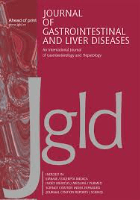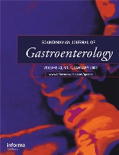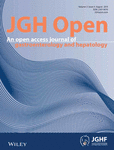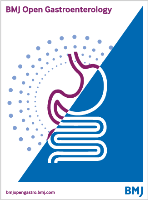
Gastroenterology Insights
Scope & Guideline
Transforming Insights into Impactful Discoveries
Introduction
Aims and Scopes
- Gastrointestinal Diseases and Disorders:
The journal covers a wide spectrum of gastrointestinal diseases, including inflammatory bowel disease (IBD), liver diseases, and gastrointestinal cancers, providing insights into their pathophysiology, diagnosis, and treatment. - Interventional and Surgical Approaches:
A significant focus is placed on interventional techniques and surgical management of gastrointestinal conditions, including endoscopic procedures, surgical techniques for various gastrointestinal malignancies, and innovative treatment modalities. - Immunology and Microbiome Research:
Research on the immune response in gastrointestinal diseases and the role of the gut microbiome is a core area, emphasizing the interaction between gut health and overall well-being. - Clinical Guidelines and Best Practices:
The journal aims to disseminate evidence-based clinical guidelines and best practices for managing gastrointestinal disorders, enhancing the quality of patient care. - Emerging Therapies and Technologies:
Gastroenterology Insights highlights advancements in therapeutic approaches, including pharmacological treatments, dietary interventions, and the application of new technologies in diagnosing and treating gastrointestinal diseases.
Trending and Emerging
- Gut-Brain Axis Research:
There is a growing interest in the gut-brain connection, exploring how gastrointestinal disorders can influence neurological outcomes and vice versa, reflecting a multidisciplinary approach to treatment. - Personalized Medicine and Targeted Therapies:
The journal has seen an increase in studies discussing personalized medicine and targeted therapies, particularly in the context of inflammatory bowel disease and liver cancer, highlighting the shift towards individualized treatment plans. - Microbiome and Gut Health:
Research focusing on the gut microbiome's role in health and disease is on the rise, with studies examining its impact on various gastrointestinal conditions and potential therapeutic applications of probiotics. - Innovative Endoscopic Techniques:
There is a trend towards exploring new endoscopic techniques and technologies, emphasizing advancements in minimally invasive procedures for diagnosis and treatment of gastrointestinal diseases. - Immunotherapy in Gastroenterology:
The exploration of immunotherapy, particularly in the treatment of gastrointestinal cancers and chronic liver diseases, is an emerging theme, reflecting the broader trends in oncology.
Declining or Waning
- Traditional Dietary Interventions:
There appears to be a decreased emphasis on traditional dietary interventions in gastroenterology, as newer research increasingly focuses on molecular and pharmacological treatments. - Conventional Imaging Techniques:
The frequency of papers centered around conventional imaging techniques has declined in favor of more advanced imaging modalities, such as elastography and contrast-enhanced ultrasound. - Basic Science Research Without Clinical Relevance:
There has been a noticeable reduction in basic science research that lacks direct clinical applicability, as the journal seeks to prioritize studies that translate findings into practical clinical settings. - Single-Center Retrospective Studies:
The prevalence of single-center retrospective studies has decreased, with a shift towards multicenter collaborative studies that offer broader insights and more robust data. - Overly General Reviews:
The journal has moved away from overly general review articles that do not provide new insights, focusing instead on systematic reviews and meta-analyses that synthesize current research findings.
Similar Journals

Journal of Gastrointestinal and Liver Diseases
Advancing Knowledge in Gastrointestinal and Liver HealthThe Journal of Gastrointestinal and Liver Diseases, published by MEDICAL UNIV PRESS in Romania, serves as a pivotal platform for the dissemination of significant research in the fields of gastroenterology and hepatology. Established in 2006, this journal has evolved over the years, currently holding a Q3 rank in Gastroenterology and a Q2 rank in Medicine (miscellaneous), reflecting its commitment to high-quality scholarship and impactful contributions to medical science.
With an ISSN of 1841-8724 and an E-ISSN of 1842-1121, the journal engages a diverse readership of researchers, clinicians, and students passionate about advancing knowledge in gastrointestinal and liver health. While it currently does not operate under an open access model, the journal remains a vital resource for those seeking to stay updated on the latest developments and emerging trends in the field. As it converges towards a broader impact, projected through its coverage until 2024, the Journal of Gastrointestinal and Liver Diseases continues to contribute to the academic landscape, encouraging innovation and comprehensive understanding in digestive health.

ZEITSCHRIFT FUR GASTROENTEROLOGIE
Pioneering Knowledge in Gastroenterology and BeyondZEITSCHRIFT FUR GASTROENTEROLOGIE, published by GEORG THIEME VERLAG KG, stands as a notable journal in the field of gastroenterology since its inception in 1971. With an ISSN of 0044-2771 and an E-ISSN of 1439-7803, this journal focuses on advancing knowledge and research in gastrointestinal health. Operating from Germany, its contributions span various aspects of gastroenterology, providing a platform for both established and emerging scholars to share their findings. As of 2023, ZEITSCHRIFT FUR GASTROENTEROLOGIE is ranked in the Q3 quartile in Gastroenterology and Q4 in Medicine (miscellaneous), reflecting its critical yet developing role in the academic community. Despite its current Scopus rank of #117 out of 167 in the gastroenterology category, the journal aims to foster innovative research and discussions vital for tackling contemporary challenges in gastrointestinal medicine. While it does not offer open access, the journal's extensive archival rigor ensures that pertinent studies remain accessible to professionals and academicians seeking to deepen their understanding and engage with evolving clinical practices.

Clinical Gastroenterology and Hepatology
Advancing the Frontiers of Gastroenterology and HepatologyClinical Gastroenterology and Hepatology, published by Elsevier Science Inc, stands as a leading journal in the fields of gastroenterology and hepatology. With an ISSN of 1542-3565 and an E-ISSN of 1542-7714, this esteemed publication has earned its place in the top quartile (Q1) of both gastroenterology and hepatology categories as of 2023, ranking 6th out of 167 and 7th out of 82 respectively. The journal aims to disseminate innovative research, clinical studies, and case reports that advance the understanding and treatment of gastrointestinal and liver diseases. Targeted towards researchers, healthcare professionals, and students, it provides crucial insights into emerging therapies and medical advancements. Clinical Gastroenterology and Hepatology is not only a pivotal resource for contemporary gastroenterological research but also fosters collaboration and knowledge-sharing within the medical community. With a converging publication history from 2003 to the present, the journal continues to build on its solid foundation of scientific excellence and relevance.

Gut and Liver
Pioneering research for a healthier tomorrow.Gut and Liver is a prestigious peer-reviewed journal dedicated to advancing the fields of Gastroenterology and Hepatology. Published by the EDITORIAL OFFICE GUT & LIVER in South Korea, this Open Access journal has been disseminating valuable research findings since 2007, making critical knowledge accessible to a global audience. With an impressive 2023 impact factor that places it in Q1 rank in both Gastroenterology (#28/167) and Hepatology (#22/82), it is recognized as a leader in the medical domain. The journal covers diverse topics, including innovative therapeutic strategies, clinical practices, and groundbreaking research in liver diseases and gastrointestinal disorders, thereby playing a vital role in improving patient care and outcomes. Researchers, healthcare professionals, and students can benefit from the journal's wealth of information, designed to foster collaboration and spark new ideas within the scientific community. For further engagement with current research, readers can access issues from 2009 to 2024 and stay updated on the latest advancements in the field.

SCANDINAVIAN JOURNAL OF GASTROENTEROLOGY
Elevating Standards in Gastroenterology Through Scholarly InquirySCANDINAVIAN JOURNAL OF GASTROENTEROLOGY, published by Taylor & Francis Ltd, is a leading journal in the field of gastroenterology, dedicated to advancing clinical and experimental research related to digestive health. With an ISSN of 0036-5521 and an E-ISSN of 1502-7708, this journal provides a platform for high-quality research that addresses the complexities of gastrointestinal diseases. Since its inception in 1966, the journal has consistently contributed valuable insights and is currently categorized in the Q2 quartile of gastroenterology journals, reflecting its impact and relevance in the field, with a Scopus rank of 87 out of 167 in Medicine - Gastroenterology. Researchers and practitioners are encouraged to explore the journal's archives to enhance their understanding and stay abreast of innovative strategies for managing gastrointestinal disorders. The SCANDINAVIAN JOURNAL OF GASTROENTEROLOGY remains a crucial resource for those committed to improving patient outcomes through rigorous scientific inquiry and the sharing of impactful findings.

ACTA GASTRO-ENTEROLOGICA BELGICA
Pioneering Research for Better Digestive HealthACTA GASTRO-ENTEROLOGICA BELGICA is a prestigious journal dedicated to advancing the field of gastroenterology through the dissemination of high-quality research and clinical insights. Published by UNIVERSITE CATHOLIQUE DE LOUVAIN (UCL), this journal is an essential resource for researchers, healthcare professionals, and students alike, focusing on a wide range of topics including gastrointestinal diseases, treatments, and innovations in clinical practices. While the journal operates under a traditional access model, its impact in the academic community is significant, ensuring that vital research is communicated effectively to stakeholders in Belgium and beyond. With its commitment to academic excellence, ACTA GASTRO-ENTEROLOGICA BELGICA plays a crucial role in fostering high-level discourse and collaboration among experts in the field, ultimately encouraging advancements that improve patient care and outcomes.

Gastroenterology Research
Fostering collaboration in the pursuit of gastrointestinal health.Gastroenterology Research is a prominent scholarly journal dedicated to advancing the field of gastroenterology. Published by ELMER PRESS INC, this journal serves as a vital platform for disseminating innovative research, clinical findings, and comprehensive reviews that explore the complexities of the gastrointestinal system. With an ISSN of 1918-2805 and an E-ISSN of 1918-2813, it reaches a global audience of researchers, healthcare professionals, and students eager to contribute to or keep abreast of the latest developments in gastroenterology. Though details such as the H-index and Scopus rankings are currently unspecified, the journal's commitment to quality and impact in the medical research community is evident. Gastroenterology Research aims to foster collaboration and knowledge sharing among experts, ultimately improving patient care and outcomes within this critical area of health science. Explore the cutting-edge studies published within its pages and engage with a community passionate about the investigation and treatment of gastrointestinal diseases.

Indian Journal of Gastroenterology
Pioneering Knowledge in Gastrointestinal MedicineThe Indian Journal of Gastroenterology, a prominent publication in the field of gastroenterology, is published by Springer India. With roots dating back to 1982 and an ongoing commitment to disseminating high-quality research, this journal serves as a vital platform for researchers, practitioners, and students interested in gastrointestinal health and diseases. It boasts an impressive track record with a Scopus rank of #82 in the gastroenterology category and a 2023 quartile ranking of Q3, firmly situating it within the competitive landscape of medical journals. Although it is not an open-access journal, the Indian Journal of Gastroenterology offers accessible research articles contributing significantly to the field, facilitating informed discussion and advancing knowledge in gastrointestinal medicine. The journal's comprehensive focus covers a wide range of topics from clinical studies to innovative therapeutic approaches, ensuring its relevance to current medical practices and the evolving challenges in gastroenterology.

JGH Open
Empowering the Future of Gastrointestinal MedicineJGH Open is a prominent open-access journal dedicated to advancing knowledge in the fields of Gastroenterology and Hepatology, published by WILEY. Since its inception in 2017, the journal has served as a crucial platform for researchers, professionals, and students to disseminate innovative research findings and clinical insights. With an impact factor and Scopus rankings reflecting its steady growth—ranking in the 3rd quartile for both Gastroenterology (Q3) and Hepatology (Q3)—JGH Open is positioned within the competitive landscape of medicine. Its commitment to open access enhances the visibility and accessibility of high-quality research, ensuring that significant advancements in understanding diseases of the gastrointestinal tract and liver reach a broad audience. With a focus on collaboration and dissemination of knowledge, JGH Open aims to contribute to the global discourse and improve outcomes in gastrointestinal health.

BMJ Open Gastroenterology
Elevating Patient Care with Open Access Gastroenterology ResearchBMJ Open Gastroenterology is a premier open access journal published by the esteemed BMJ Publishing Group, focusing on the dynamic and evolving field of gastroenterology. Established in 2014, the journal has rapidly ascended in stature, reflected in its impressive 2023 Q1 ranking in gastroenterology and its position within the top 25% of journals in the category according to Scopus. With a mission to disseminate high-quality, peer-reviewed research with global significance, the journal provides a vital platform for researchers, professionals, and students alike to share their findings and advancements in gastrointestinal medicine. Operating from its headquarters in London, England, the journal's open access format ensures wide visibility and accessibility of cutting-edge research, making it an invaluable resource for those dedicated to improving patient care and driving innovation in gastroenterological sciences. By engaging with this journal, contributors and readers can stay at the forefront of critical developments in the field, fostering a collaborative environment for knowledge exchange.